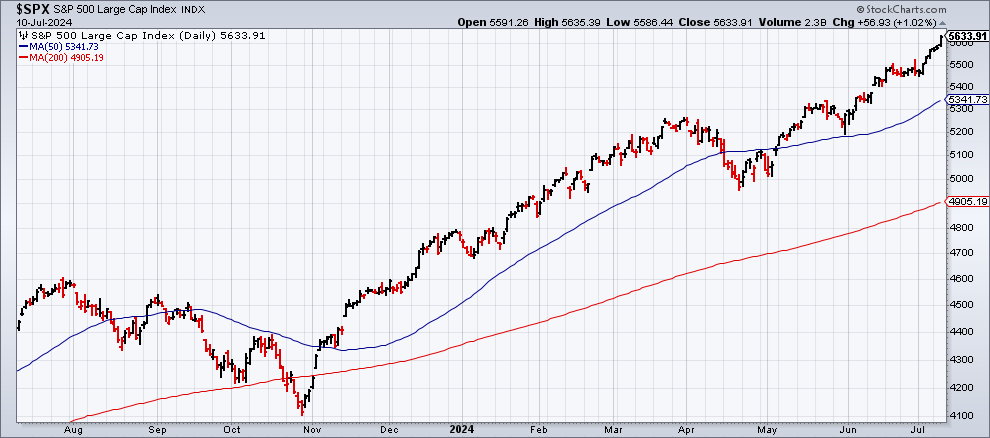
US Stocks Look Overbought. Will It Matter (Anytime Soon)?

The S&P 500 Index closed sharply higher on Wednesday (July 10), rising to yet another record high… Beta risk, in other words, is making more investors look like geniuses this year…Not surprisingly, valuations are high, as the CAPE and other indicators suggest…For another perspective, t…
The S&P 500 Index closed sharply higher on Wednesday (July 10), rising to yet another record high. Beta risk, in other words, is making more investors look like geniuses this year. The question is whether the increasingly strong ex post returns are borrowing from the ex ante data?
The answer is almost certainly “yes.” As always, timing is unclear for when the revival of equilibrium arrives. But as the market moves higher, the risk calculus becomes clearer, or so history suggests.
The alternative view: “Stock prices have reached what looks like a permanently high plateau.” It’s possible, but the historical record doesn’t inspire confidence.
For those who like to weigh the odds for what appears to be possible (likely), consider some chart candy that offers a bit of perspective. Let’s start with the S&P 500, which has surged over the past year.
Not surprisingly, valuations are high, as the CAPE and other indicators suggest. Forecasting S&P 500 returns based on earnings-yield and dividend-yield models continue to project modestly negative returns.
For another perspective, the market appears overbought on a short-term basis, according to CapitalSpectator.com’s S&P Sentiment Momentum Index. The current reading isn’t unprecedented, which leaves room for even higher prices, but relatively high print is a reminder that we’re probably closer to a near-term top vs. anytime in the past three years.
Adjusting the S&P 500 based on the VIX Index paints an even more dramatic profile. Because market volatility has remained low while prices have climbed, this measure of market trend suggests overbought conditions are stretched in the extreme.
The pushback to the analytics above is that the market reflects a new world order of AI-drive productivity and growth gains. On this basis, historical comparisons matter less, perhaps not at all. Alas, no one can refute that view for the simple reason that the future’s unclear.
What is clear is that for investors with a relatively a low risk tolerance and/or a short-medium time horizons, the case for rebalancing looks timely. The risk for deploying that advice is forgoing future gains in some degree. Deciding not to rebalance, on the other hand, comes with a somewhat different risk profile. Pick your poison.

Author: James Picerno




